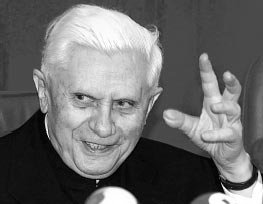Credo
Bitch. Ph.D. is always a good place to go for a good discussion. Several days ago she started one that has been fascinating reading, and that I’d like to see spread more broadly: we often talk about so-called feminisms
–emphasizing the variety amidst our unity. Well, O.K.; but that does mean that at some point you’re going to have to come out and say what your commitment to feminism does mean for you. So,
she asks, What is your feminism about?
Here’s what the good doctor had to say about it herself:
In many ways, I suspect my feminism is fairly bourgeois. I don’t want a revolution that doesn’t allow me to dance, flirt, and buy shoes. On the other hand, my feminism is fairly absolute in that I will not allow myself (or others) to demonize “radical feminists” or to ignore poor women or women of color, and I object very strongly when I see women fighting with each other over crumbs. I’m sure I do it too, sometimes, but I try very hard not to. My feminism is material in the sense that I believe that the body is irreducible (more and more so, as I age, and more since becoming a mother). I do not believe that there are no differences between men and women; but I believe that what differences there are have been vastly exaggerated by social conditioning, and I reject essentialism. My feminism likes men, and is sympathetic to the ways that they, too, suffer from narrow definitions of gender. My feminism insists on being heard, and will not give up a fight, and will not back down. On the other hand, my feminism deplores unfairness, meanness, and insensitivity. I believe in principles, including the principle that people matter. I believe in forgiveness and second chances, and in teaching, and in learning; and I also believe in having high expectations and firm boundaries. My feminism is polemical but embraces ambiguities. My feminism is aggressive and protective.
I think that most of what I would have to say at length would come around to many (tho’ not all) of the same points. I’m actually probably less concerned than she is with whatever suffering men might face (as men–gay-baiting and gay-bashing are different issues) under patriarchy. But I thought this was beautiful, and when it comes to teaching, and learning, sympathy and solidarity, high expectations and an absolute commitment to compassion over hurtfulness and meanness, I couldn’t agree more.
And for myself? Here’s how I try to put things when I come to think about what my commitment to feminism means for me:
My feminism is simple and direct. Politics is hard and complicated, but ideology shouldn’t be. If you like ticking things off, you could say that my feminism rests on Five Pillars. Here they are:
It’s wrong to hurt other people. There are no excuses for hurting other people who have done nothing to deserve it.
Women are people.
In the society we live in, men hurt women who have done nothing to deserve it, all the time, more or less with impunity, because these men regard hurting women as something that they have a right to do.
I have a responsibility (and so do you) to do what I can toward ending that–immediately, entirely, and for good.
Women know more than I do about how men hurt them, and about how to end that.
The rest is all details.
So. What about you? What is your feminism about?




